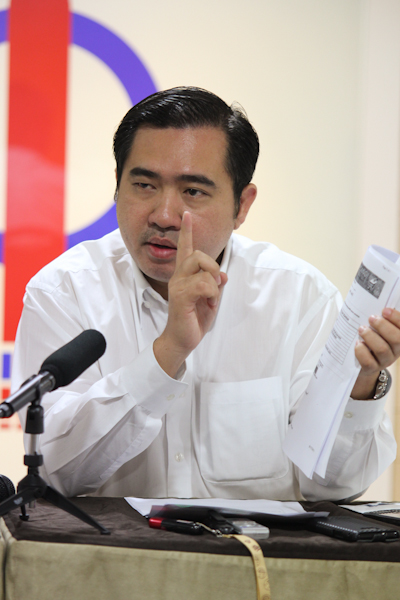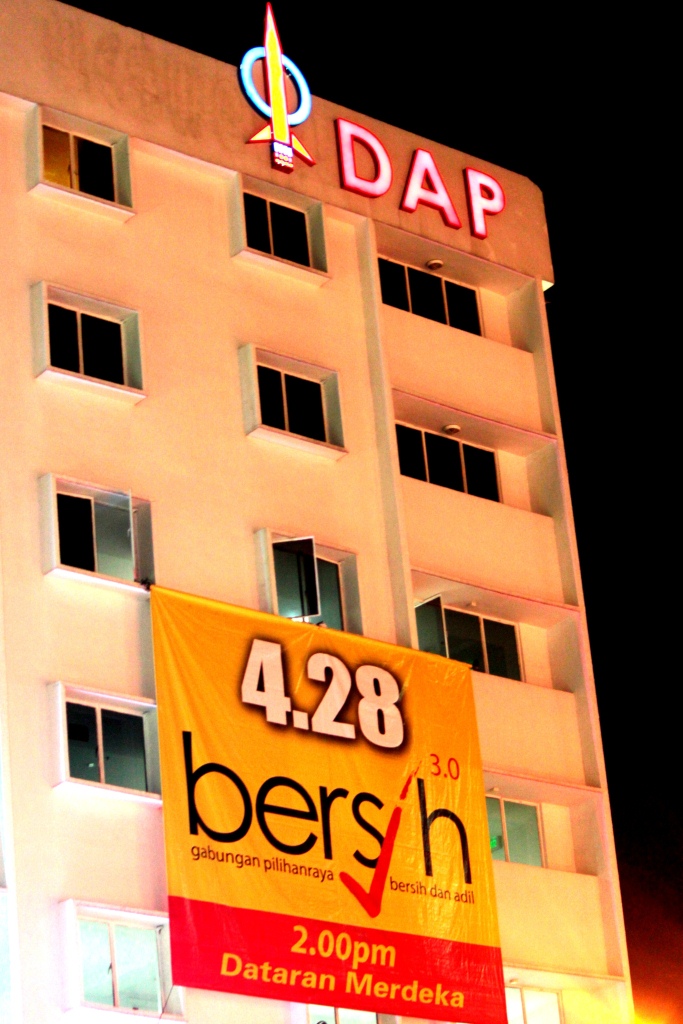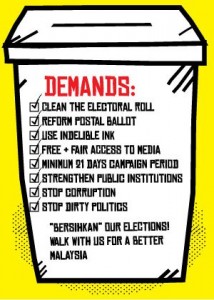Malaysians need to understand why the call for BERSIH 3.0 peaceful sit-in is crucial for our fundamental freedom, the right for free and clean elections. The Rocket’s T.K Tan explores some of the contentious issues involved in electoral reform and speaks to DAP political education director and Rasah MP Anthony Loke for his views on the Parliamentary Select Committee’s findings and recommendations.
Postal votes
 The April 2 report by the Parliamentary Select Committee (PSC) on electoral reform produced 22 recommendations, in which four of the 22 were opposed by Pakatan Rakyat (PR).
The April 2 report by the Parliamentary Select Committee (PSC) on electoral reform produced 22 recommendations, in which four of the 22 were opposed by Pakatan Rakyat (PR).
Loke explains PR’s first contention- expanding postal voting to media personnel, “PR’s principle is to reduce and reform the postal voting process. The postal vote has always been a contentious issue because of the element of fear hanging on the postal voters and its accuracy.”
“Previously, with both the police and military personnel counted together, there were more than 200,000 postal voters. With the recommendation of using advance voting this should have resolved the issue.”
According to the Election Commission (EC) there were more than 140,000 EC staffs who voted through postal voting in the last general elections (GE). “In this coming GE, EC says that more than 240,000 on-duty EC official and staffs may potentially be assigned as postal voters,” he said.
“We do not object to early voting for media personnel. We want them and the EC personnel to vote through advance voting as well.”
Campaign period
For the minimum campaign period, Loke disputes the reasonableness of a 10 day period for campaigning.
“In campaigning, the candidates need time to go to the ground to campaign. In Sarawak, some of the parliamentary constituencies are as big as states in Peninsular Malaysia. Candidates wouldn’t be able to meet majority of the voters in 10 days, let alone talk to them meaningfully,” Loke says.
“EC’s argument that it is costly to conduct longer period is not valid. It is costly to the candidates, not to EC or the government,” he chastised.
In addition, Loke points out that if postal voting were to be extended to overseas voters, the 10 day campaign period would be insufficient as the whole mechanics of postal voting takes time. First, the votes need to be sent to the voters by post; subsequently the voters need to send it back to the embassy to be forwarded to the constituencies in Malaysia. That would easily take around two weeks,” he explains.
Automatic voter registration
The PSC’s recommendation to pre-register citizens upon reaching 20 years old as voters has complicated the core issue, which is automatic registration of voters.
“Malaysia has a comprehensive system of registering a newborn citizen. Every citizen will be issued a birth certificate upon birth. Upon reaching 12 years of age, they would be issued an identity card (IC). Upon reaching 18 years the IC will be changed to a MyKad.”
“The moment a Malaysian changes his IC to a MyKad, his name can be listed on the EC database. Their names and addresses can be inserted into the ER automatically.”
“If a person was to register himself EC will have to engage manpower to register them separately and manually. Automatic registration will cut down the cost of voter registration,” Loke elaborated.
Voting age should be 18
 “PR had asked for the legal voting age to be lowered to 18 from the current 21, though BN has objected to it. Any sane Malaysian can marry at the age of 18 without parental consent; he or she is by definition an adult. More than 150 countries in the world have adopted 18 as the official voting age. Automatic registration is not the same as compulsory voting. The people still have a choice whether or not to vote.”
“PR had asked for the legal voting age to be lowered to 18 from the current 21, though BN has objected to it. Any sane Malaysian can marry at the age of 18 without parental consent; he or she is by definition an adult. More than 150 countries in the world have adopted 18 as the official voting age. Automatic registration is not the same as compulsory voting. The people still have a choice whether or not to vote.”
“Secondly, by asking that EC study the option of automatic registrations, with no assurance of implementing it, these two recommendations point to one thing, the EC and BN doesn’t want to the lower voting age and automatic voter registration.”
“Saying EC requires a long time frame to adopt it due to the ongoing electoral roll (ER) cleaning process and to study and take action on it only within 12 months is not acceptable. The government is just buying time and space for its survival,” he said.
Cleaning the Electoral Roll
Apart from the objections to the four recommendations, PR submitted a minority report that specifically addresses the issues in the electoral roll.
“The MIMOS audit of the electoral roll (ER) had shown that there were no repetitive IC numbers, no dead people listed and no voters below 21 years old in the ER. However, these findings do not vindicate EC in this matter.”
The biggest issue that MIMOS found was the presence of multiple voters in one address, with 51 to 100 voters in 938 locations and 100 and more voters in 324 locations with the same addresses.
“The contentious part is EC’s refusal to take action against the 42,000 dubious voters in the ER after uncovering them. These are voters who are not on the National Registration Department (NRD) list but are on the ER.”
“EC says that these may be legitimate voters who haven’t received or updated their MyKad, hence the need to maintain them. This is unacceptable; no voters can be admitted without a MyKad,” he pointed out.
The EC had done a round of cleaning up the ER and found 42,000 voters with uncertain nationality and dubious status before the MIMOS audit was carried out.
Relocated without consent
In addition, EC had relocated some voters outside of its mandated period and without the consent of the voters. “EC gave the excuse that they have wrongly keyed in locality for the voters and they were amending it after GE.”
“This would confuse the voters. When they go to their previous voting stations and can’t find their names on the ER, it will create havoc and distress for the voters in looking for their changed constituencies. This will discourage the voters from exercising their voting right. EC can’t do that; the voters should be reverted back to their original voting constituencies.”
The fact that a prominent personality such as Selangor Menteri Besar (MB) Tan Sri Khalid Ibrahim ’s voting locality can be changed to a different state without his knowledge, raises questions about EC’s system of relocating voter’s locality. “They are contradicting their own stated principles. They are not following it,” Loke queried.
“PR had also raised other objections on the current ER; however the EC and the government have ignored it. PR can’t do much beyond this point. The people need to give public pressure to the government to reform. Even if we were to explore the option of taking EC to court to force them to take action, it will take years before we see results.”
Fulfilling the BERSIH Demands
 Loke gives a failing grade to the government on the eight demands by BERSIH 2.0. “On cleaning the electoral roll, there are many aspects that have yet to be addressed. Hence the need for PR’s minority report.”
Loke gives a failing grade to the government on the eight demands by BERSIH 2.0. “On cleaning the electoral roll, there are many aspects that have yet to be addressed. Hence the need for PR’s minority report.”
“As for the other three namely free and fair access to media, stop corruption and stop dirty politics the proposals language is still vague. There are no specific steps to address these demands. Only the use of indelible ink is satisfactory,” Loke commented.
As for the 22 PSC recommendations, “it is a report, not a law. It is not binding; unless Parliament adopts the recommendations, it remains just that.”
“The entire exercise was meant to give the impression that Najib is a reformist who is implementing transformation in the country. BN is looking to win political goodwill from the people in order to win the next GE.”
Why BERSIH, again
Why then the BERSIH rally? Loke reminds Malaysians it is crucial for several reasons. “It is part of the civic education for the people on the issues involved.”
“It will act as huge pressure on the EC and government to rectify the flaws that were identified. This government is reactionary; as a result of BERSIH 2.0, the PSC on electoral reform came about.”
“BERSIH 3.0 will create awareness for the people of the electoral fraud that has gone on for decades. BN will not easily change a system that has served them so well. BERSIH is needed to bring people together for a common cause.”
“Lest we think a rally wouldn’t affect the results, let’s be reminded that after the previous rally, it finally pressured to EC to come out with the 42,000 dubious voters list.” – The Rocket



